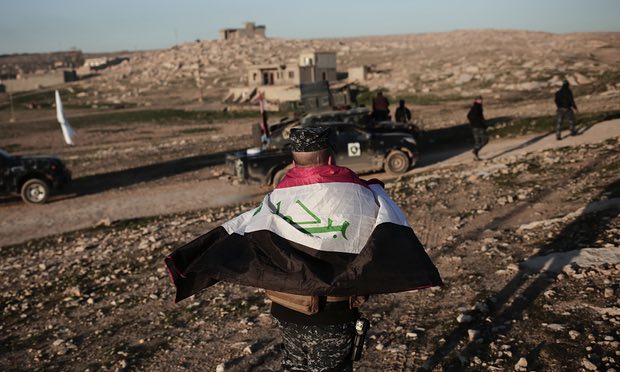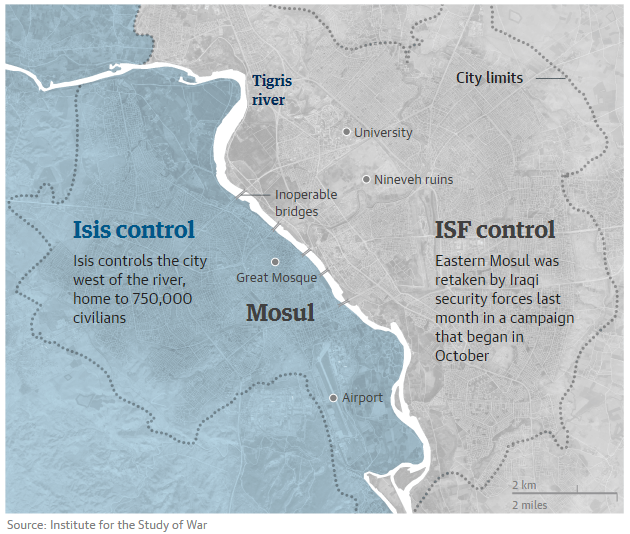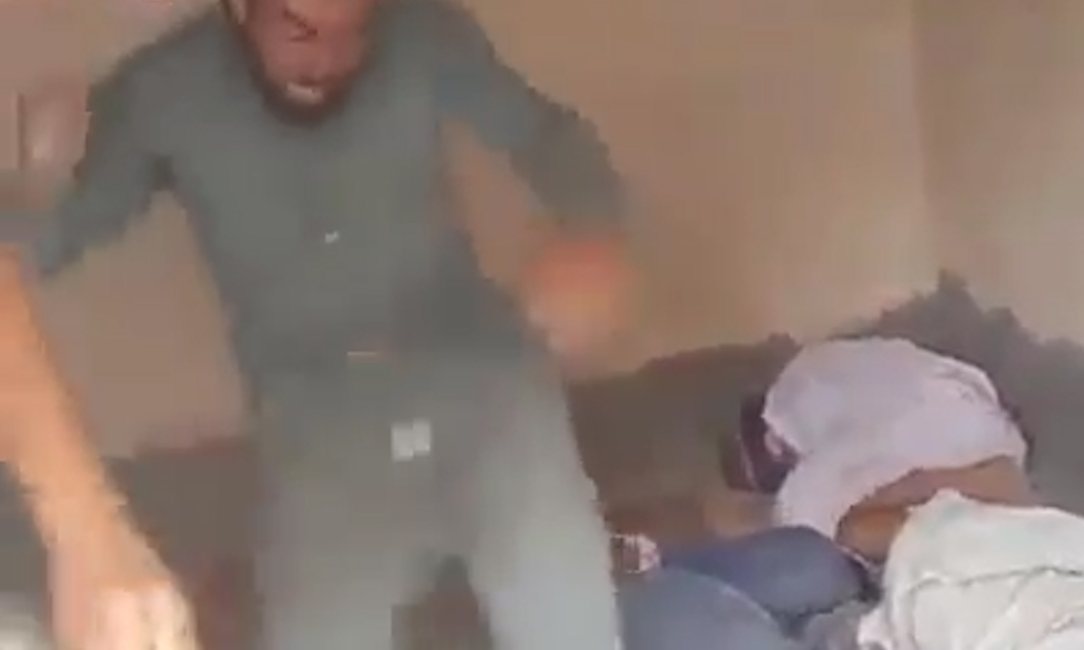Hundreds of military vehicles, backed by air power, were filmed travelling across the desert towards the jihadis’ positions in the city early on Sunday. Plumes of smoke were seen rising into the sky as US-led coalition jets struck at least nine militant positions in south-west Mosul.
Government forces retook the eastern side of the city, which is the last major Isis stronghold in Iraq, last month. But military officials say the western side of the city, with its narrow, winding streets, may prove a bigger challenge.
The army said it had captured at least 11 villages to the south of the city in the first few hours of the offensive, taking it within striking distance of Mosul airport.
“This is zero hour and we are going to end this war, God willing,” Mahmoud Mansour, a police officer told Reuters, as he prepared to move out.
Police units quickly moved into the village of Athba, about 3 miles (5km) south-west of the airport, encountering only light resistance, according to an AP reporter.
The army’s ninth division moved into the village of Bakhira, also south-west of the city, the Iraqi Ministry of Defence said.
But humanitarian workers warned the offensive would be judged not on the speed of the army’s progress but rather on what happens to the estimated 650,000 civilians still trapped in Mosul.
“The ultimate success of the offensive will be judged not on how many districts and villages are taken back but on how well Iraqi forces and the US-led coalition protect civilians in the coming weeks and months,” said the Norwegian Refugee Council’s country director in Iraq, Wolfgang Gressmann. “The lives of hundreds of thousands of civilians are on the line.”
The launch of the new offensive coincided with graphic videos of men in Iraqi security force uniforms carrying out beatings and killings of unarmed people on the streets of Mosul.
“While this operation has seen so few incidents of abuse compared with earlier operations, it is vital that prime minister Haider al-Abadi takes them seriously when they do come up,” said Belkis Wille, who has documented human rights abuses in Iraq for Human Rights Watch. “We often see the authorities creating investigative committees – we rarely see results. Let’s hope it is different this time.”
Security forces have been broadly welcomed by residents weary of Isis’s brutal rule, and praised for their restraint through months of gruelling urban warfare, defying fears that the assault by Shia-dominated forces on a Sunni-majority city could spark a sectarian bloodbath.
But the videos appear to undermine that image and highlight underlying tensions within Mosul where many remain wary of Baghdad and the Shia militias that bolster its power.
In one of the bloodiest films, a man behind the camera urges on a group in Iraqi federal police uniforms as he films them clubbing four men in civilian clothes. “Well done – you did a good job,” he says, before the attackers drag the men down an asphalt road, and then kill three of them with machine guns.
The prime minister’s office has launched an investigation into the videos as a precaution, although it insisted it considered them a fabricated slur. “If it is proven that there were abuses, the perpetrators will be handed over to the courts. In other operations there were individuals who committed abuses and … some were sentenced,” a spokesman, Saad al-Hadithi, said.
The UN has voiced concern about civilians trapped in Mosul, amid reports that they could number up to 650,000. Leaflets warning residents of an imminent offensive were earlier dropped over the west of the city.
The United Nations humanitarian coordinator for Iraq, Lise Grande, said 400,000 men, women and children could be displaced by the latest offensive as residents suffer food and fuel shortages and markets are closed.
About 160,000 civilians have been displaced since the start of the offensive in October. Medical and humanitarian agencies estimate the total number of dead and wounded – both civilian and military – at several thousand.
The charity Save the Children said on Sunday it believed that as many as 350,000 children were trapped.
“This is the grim choice for children in western Mosul right now: bombs, crossfire and hunger if they stay; or execution and snipers if they try to run,” said the charity’s Iraq country director, Maurizio Crivallero.
Before the launch of the latest operation, Abadi said in a televised speech: “We announce the start of a new phase in the operation, we are coming to Nineveh to liberate the western side of Mosul.”
“Our forces are beginning the liberation of the citizens from the terror of Daesh [Isis],” he added, quoted by Agence France-Presse news agency.
Source www.theguardian.com/world/2017/feb/19/torture-videos-cast-shadow-over-iraqi-forces-west-mosul-offensive




 RSS Feed
RSS Feed